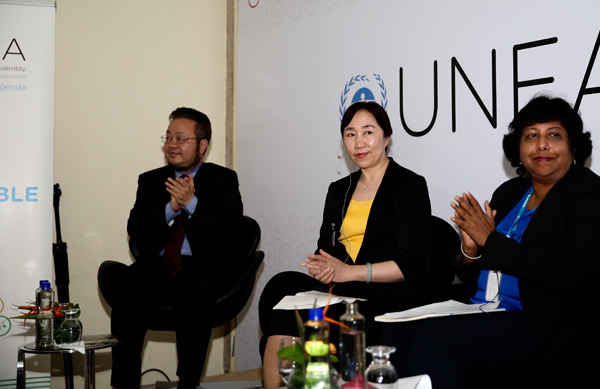
Experts say Beijing's air quality will meet the World Health Organization's Grade 1 standards, as ever growing public concern and stern resolve from China's central government have put great pressure on local government leaders.
The comments came as a new report — A Review of Air Pollution Control in Beijing: 1998-2013 — was made public on Wednesday at United Nations Environment Programme (UNEP) headquarters in the Kenyan capital of Nairobi, where the second session of the UN Environment Assembly is being held.
The report said a comprehensive air pollution program launched in Beijing in 1998 has been largely successful.
Carried out by UNEP and the Beijing Municipal Environmental Protection Bureau, the report found that carbon monoxide and sulphur levels are now below limits set by China's National Ambient Air Quality Standards, while nitrogen dioxide and PM 10 levels are also inching closer to standards.
The trend has been driven by a decrease in coal consumption in the power sector and a drop in vehicle emissions resulting from vehicle emission control measures, the report said.
Coal use fell from a peak of 9 million tons in 2005 to 6.44 million tons in 2013, while the 2013 levels of carbon monoxide dropped by 76 percent compared to 1998.
Li Xiaohua, deputy director of the Beijing Environment Protection Bureau, said in a media roundtable at the UNEA that the satisfying situation continued from 2013 to 2015.
Air quality improvement continues from 2013 to now with an annual concentration of SO2 down to 13.5 micrograms per cubic metre (μg/m3) by 2015 and PM 2.5 concentrations down from 89.5 μg/m3 in 2013 to 80.6 μg/m3 in 2015, she said.
With the 2013-2017 Beijing Clean Air Action Plan implemented in 2013, by the end of 2015, the core area of Beijing city had become a coal-free zone, more than 1.22 million old polluting vehicles had been scrapped, 8,800 diesel buses had been retrofitted, more than 1,000 polluting enterprises were closed or relocated and trees have been planted on an additional 70,000 hectares of land.
A working group from Beijing and six of its neighboring provinces and municipalities was established to coordinate air pollution control at the regional level, as about 30 percent of the city's PM 2.5 is found to be contributed by regional migration, she added.
There are still "great challenges for the further improvement of air quality in Beijing," she said, "as people have higher expectations of environmental quality and the central government has raised clear targets for the capital's environmental and ecological quality."
"We are confident that we will be able to have better air quality and better cities through our sustained efforts," Li said. "We are always open for cooperation and sharing our experience and lessons with cities around the world through the UNEP platform."
He Kebin, dean of environmental studies at Tsinghua University, said: "We still have some way to go before achieving the World Health Organization air quality standards. Nevertheless, we are confident that we are on the right path."
He said Beijing will be able to meet air quality Grade 1 by WHO guidelines for China in 10 to 15 years.
He said the central government has asked provincial governors to sign a commitment, which has been published. Rankings will be issued for air quality and governors with bad rankings will be criticized.
"They will feel very strong pressure from that," He said.


















































